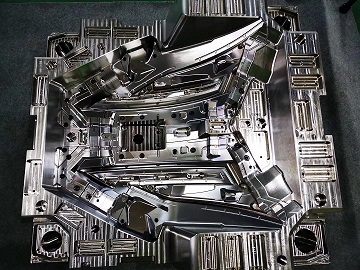Advancements in Plastic Prototype Manufacturing: Two-Shot Mold!

The world of plastic prototype manufacturing has seen remarkable innovations in recent years, driven by the ever-evolving demands of various industries. Among these advancements, two-shot molding and insert-over molding have emerged as groundbreaking techniques that have revolutionized how plastic prototypes are produced. In this article, we will delve into the concepts of two-shot molding and insert over-molding, exploring their benefits and applications and highlighting the role of plastic prototype companies in driving these innovations.
Two-shot injection molding: A Game-Changer in Plastic Prototyping
two shot injection modling, also known as two-component or 2K molding, is a specialized injection molding process that produces plastic prototypes with multiple materials or colors in a single cycle. This technique involves using a specialized injection molding machine with two or more barrels and nozzles, each containing different materials. Here’s how it works:
Injection of the First Material: The first material, usually a rigid plastic, is injected into the mold cavity to create the initial part or component. This is typically the main structure of the prototype.
Mold Rotation or Indexing: After the first shot, the mold is rotated or indexed to align with a different set of nozzles containing a second material.
Injection of the Second Material: The second material, often a softer or elastomeric plastic, is injected into the same mold cavity, over-molding the first material. This creates a composite part with distinct properties and colors.
The Best Benefits of Two-Shot Molding
Enhanced Design Flexibility: two shot mold enables the integration of different materials with varying properties in a single part, allowing for improved functionality and aesthetics.
Cost Reduction: Two-shot molding can reduce production costs and lead times by eliminating the need for secondary assembly processes.
Improved Part Integrity: The bond between the two materials is vital, ensuring better part integrity and durability.
Applications of Two-Shot Molding:
Two-shot molding finds applications in various industries, including automotive, medical, consumer electronics, and more. It is commonly used for producing components such as soft-touch grips, seals, buttons, and multi-colored parts in consumer products.
Insert Over Molding: Combining Strength and Functionality
Insert over molding is another innovative technique that has gained prominence in plastic prototype manufacturing. This process involves encapsulating or overmolding metal or plastic inserts with thermoplastic material. The result is a composite part with the insert’s strength and the plastic overmold’s versatility.
Insert over molding is another innovative technique that has gained prominence in plastic prototype manufacturing.
Critical Steps in Insert Over Molding:
Insert Placement: The metal or plastic inserts are placed into the mold cavity before the injection molding begins.
Over Mold Injection: Molten thermoplastic material is injected into the mold, covering and bonding with the insert to create a unified component.
Benefits of Insert Over Molding:
Strength and Durability: Insert over molding combines the power of metal or plastic inserts with thermoplastic materials’ flexibility and design possibilities.
Reduced Assembly: This technique reduces the need for secondary assembly operations, streamlining the production process.
The Role of Plastic Prototype Companies
Plastic prototype companies are pivotal in driving these innovations in plastic prototype manufacturing. These companies have state-of-the-art machinery and a team of skilled engineers and designers who collaborate to bring cutting-edge techniques like two-shot and insert-over molding to life. Here’s how they contribute to the advancement of the industry:
Research and Development: Plastic prototype companies invest in research and development to stay ahead of the curve regarding new materials, processes, and technologies. This enables them to offer clients the latest and most efficient solutions.
Customization: These companies work closely with clients to understand their needs and design prototypes tailored to their requirements. They have the expertise to optimize designs for manufacturability and cost-effectiveness.
Conclusion
In the ever-evolving landscape of plastic prototype manufacturing, two-shot molding, and insert-over molding have emerged as game-changing techniques that offer enhanced design flexibility, cost savings, and improved part integrity. These innovations are made possible by the expertise and capabilities of plastic prototype companies, which continue to push the boundaries of what is possible in the field. As industries demand more versatile and durable prototypes, the collaboration between manufacturers and plastic prototype companies will remain critical in driving progress and innovation.
